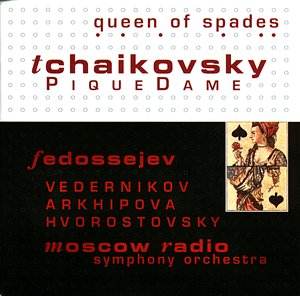Outside Russia, and certainly in the UK, productions
of operas by Tchaikovsky are often limited to the lyrical Eugene
Onegin, and, by some distance, the more dramatic Pique Dame -
his penultimate work in this genre. Both works are based on poems
by Pushkin. The present set is unique in presenting read extracts
from the poem interspersed by arias from the opera.
Pique Dame tells the story of the fated love
of a young officer, Hermann, for Lisa, grand-daughter of the Countess,
a renowned gambler, and who is believed to hold the secret of
the three cards. Lisa is betrothed to Prince Yeletsky. Hermann
believes he lacks the money to displace Yeletsky and that the
only way to obtain it is by winning at cards. To succeed he needs
the Countess’s secret. She dies of shock as he seeks it from her.
However, she returns as a ghost and reveals the satanically influenced
secret to him as ‘three seven and ace’. She also encourages him
to marry Lisa. Hermann gambles all against Yeletsky, but the third
card is the Queen of Spades and the Countess’s apparition appears
to him again as he stabs himself. The devilish pact is fulfilled.
On record Pique Dame has had a mixed history,
with theoretically ideal casts being marred by recording quality
or the odd flawed soloist. That changed with Gergiev’s 1992 recording,
where the conductor’s dynamism and feel for the idiom is allied
with an excellent team of soloists. It immediately became a clear
first choice (Philips). That issue shared with the present set
the veteran Irina Arkhipova, as the Countess. Hers is a portrayal
that reeks of experience. Her full tone, excellent diction and
phrasing are allied to well held legato. This she can mobilise
at very slow speed, in her great aria (CD2 Tr.5), and where she
slips imperceptibly from Russian into French. Natalia Datsko takes
the role of her grand-daughter, Lisa. Datsko’s full-toned voice
is more dramatic than lyric and is even throughout its wide range.
Her palette of vocal colour is well used in expressing Lisa’s
many emotions (CD2 tr.9). A particular pleasure is her duet with
the mellifluous-toned mezzo of Nina Romanova as Pauline (CD1 trs.8-9).
Lisa’s betrothed, Yeletsky, is portrayed by Dmitri
Hvorostovsky who also sang the part in Ozawa’s flawed recording
for RCA. His singing is outstandingly expressive, secure throughout
the range, and allied to full fresh even tone. It is a formidable
portrayal. Good as Chernov is for Gergiev, Hvorostovsky is better.
His rendition of Yeletsky’s Act 2 aria, in which he states his
love for Lisa (CD2 tr.1), is justifiably treated to enthusiastic
applause. Hvorostovsky is well matched for vocal strength by the
Hermann of Vitaly Tarashchenko. His typical Slavic tenor has baritonal
overtones and a slightly husky quality. However it is a true tenor
voice with plenty of heft for the dramatic outbursts. He is, however,
able to lighten his tone to lyric tenderness as he pours out his
love to Lisa (CD1 tr.11). Equally well thought and expressed are
his use of phrasing and tone as he meets the Countess (CD2 tr.6)
and later as he reads Lisa’s forgiveness.
The minor solo parts are all sung convincingly
and with good tone; not a Slavic wobble within sight or, more
relevant, hearing. Most impressive too is the vibrant chorus,
even more so the orchestral playing under Vladimir Fedoseyev,
their long time conductor. He draws fine playing and conveys the
episodic drama superbly. Although denoted ADD the recording is
full and clear with an excellent balance. The occasional instances
of applause, all well deserved, are not unduly extensive or intrusive.
The ‘bonus’ of the reading of extracts from Pushkin’s
poem, interspersed with arias from the opera, will mainly be of
interest to Russian speakers and those spotting names for the
next generation of singers from Russia. The booklet has the text
of the opera in Cyrillic and ‘Roman’ form with a translation in
English. The artist profiles are given in Russian and English
but are shy on dates of birth. There are plenty of spelling errors
in the English translation. The track listings would have benefited
from English translation and reference to a numbered page in the
libretto, the pages of which are not numbered.
Caught with the tension of a live performance,
but without the disadvantage of stage movement, this well sung
and played idiomatic performance is a worthy addition to the catalogue.
It also has the benefit of Hvorostovsky’s Yeletsky, caught at
the peak of form a few months after he won the accolade of ‘Cardiff
Singer of the World’. It can stand alongside, or compete with,
Gergiev’s well cast and conducted studio recording.
Robert J Farr
